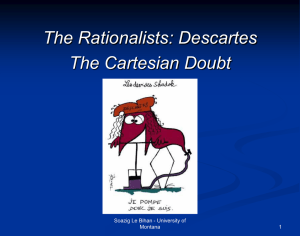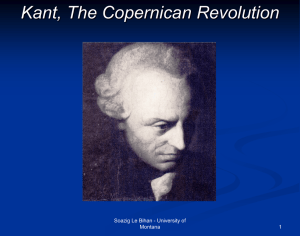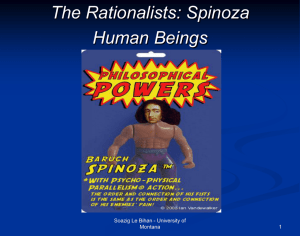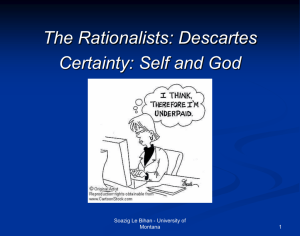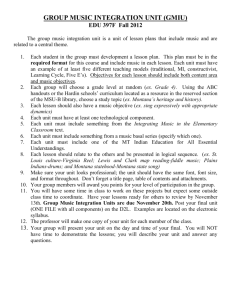Spinoza, Introduction and the Basics of his
advertisement
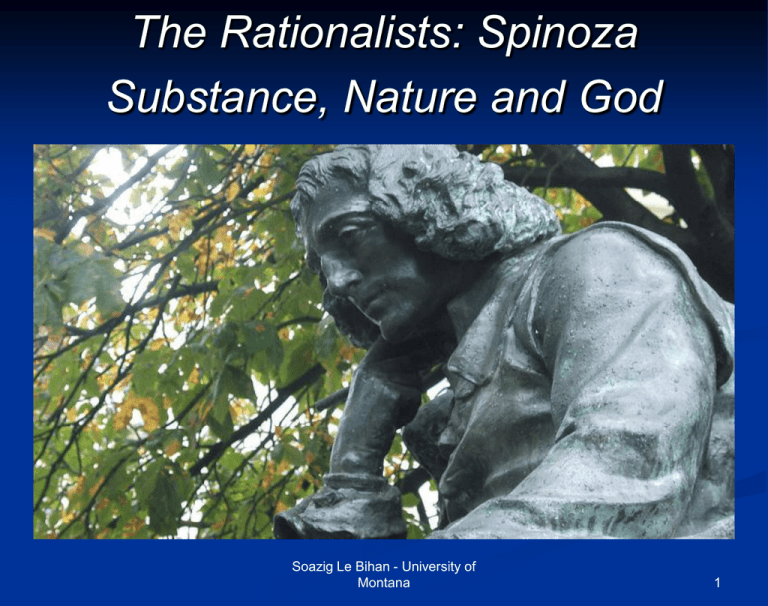
The Rationalists: Spinoza Substance, Nature and God Soazig Le Bihan - University of Montana 1 Outline 1. Introduction: Spinoza, Life and Work 2. The Geometrical Method 3. Basic Metaphysics: Substance, Nature and God 4. Conclusion Soazig Le Bihan - University of Montana 2 Spinoza: Life and Works Spinoza: - 1632: born, Amsterdam – Jewish Portuguese Modest - 1656 excommunicated – 1660 expelled: religious views - Secluded life (lenses) - 1677 dies La Hague Work: - Published in his own name: Descartes’ Principles of Philosophy - Everything else: anonymous or posthumous, including the Ethics Soazig Le Bihan - University of Montana 3 Spinoza : Background and Aims Intellectual Background: Descartes - Takes: Rationalism, new science and rigor of reasoning - Rejects: method, dualism, philosophy of human nature Ethics: - Abstract, geometrical order - Entirely oriented toward ethics of well being and joy Soazig Le Bihan - University of Montana 4 Outline 1. Introduction: Spinoza, Life and Works 2. The Geometrical Method 3. Basic Metaphysics: Substance, Nature and God 4. Conclusion Soazig Le Bihan - University of Montana 5 The Geometrical Order What is the geometrical order: - Euclid’s Elements of Geometry - Aristotle’s method of science Why the geometrical order? - More difficult : analysis vs synthesis - Various explanations Differences between Spinoza and Euclid: - Scholia - Definitions What does guarantee the truth of the definitions? Common Notions Soazig Le Bihan - University of Montana 6 Outline 1. Introduction: Spinoza, Life and Works 2. The Geometrical Method 3. Basic Metaphysics: Substance, Nature and God 4. Conclusion Soazig Le Bihan - University of Montana 7 Basic Metaphysics: Substances, Attributes and Modes (1) Basic Metaphysics: Only one fundamental constituent of the world: God, or Nature. All other beings are modifications of the substance Substance: =``that which is in itself and is conceived through itself” Exists necessarily, causa sui, infinite, unique of their kind Modes: = the ways in which the substance can be ``affected” = modified Depends on the substance, caused by something else, multiple Soazig Le Bihan - University of Montana 8 Basic Metaphysics: Substances, Attributes and Modes (2) Attributes: = the ways in which the substance can be comprehended by an intellect Aspects of the substance Ex: Thought, extension Modes of the attributes: = the ways in which the modes can be comprehended by an intellect Aspects of the modes Ex: ideas, bodies Soazig Le Bihan - University of Montana 9 Basic Metaphysics: Substances, Attributes and Modes (3) Substance: Ocean Attribute: Wave Movement Mode: Particular Wave Soazig Le Bihan - University of Montana 10 Basic Metaphysics: Deus sive Natura (God, or Nature) God exists necessarily - Ontological argument: God = substance - Modal argument: necessary existence if not impossible - Cosmological argument: finite beings infinite being - Ontological argument (2): God = absolutely perfect The unique substance - Argument: possess all possible attributes, and no two substances share the same attributes (Identity of Indiscernibles) - God, or Nature, IS everything and everything is in it Soazig Le Bihan - University of Montana 11 Basic Metaphysics: Eternal Necessity of Everything Everything exists necessarily as a necessary consequence of God’s nature -Mathematical or Logical necessity -God, or Nature: ``Logical” cause of everything Two modes of existence - Substance and its attributes: Natura naturans – “naturating” nature - Modes and modes of the attributes: Natura naturata – “naturated nature” 12 Basic Metaphysics: God and Freedom God did not “create the world by an act of free will” Necessary unfolding of its nature: how is this free? Spinoza on Freedom - Freedom does not require contingency - Freedom = absence of external constraints and autonomy: One does what one does for no other cause than oneself Soazig Le Bihan - University of Montana 13 Basic Metaphysics: Nature Has No Ends Against traditional religion: “Superstition” Finalist, Anthropomorphic, Human-centered morality, Worship Why do we reason this way? Analogy with ourselves Xenophanes: if cows had Gods, these Gods would have horns Why is it damageable? Ignorance, Superstition and Unhappiness Why is it false? Necessary unfolding, God does not lack anything Soazig Le Bihan - University of Montana 14 Outline 1. Introduction: Spinoza, Life and Works 2. The Geometrical Method 3. Basic Metaphysics: Substance, Nature and God 4. Conclusion Soazig Le Bihan - University of Montana 15 Conclusion: Spinoza’s Metaphysics Soazig Le Bihan - University of Montana 16
